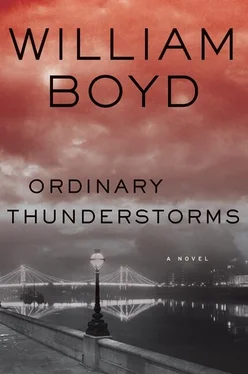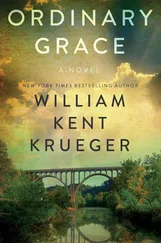On the way upstream to Chiswick they had passed the Bellerophon and she had given the klaxon a toot but there was no sign of life on deck. In fact in the dozen or so times she’d passed her home since she’d begun at MSU she’d never seen her father. He was sulking below, she knew: somehow her new job with the river police irritated him more than when she’d been on the beat in Chelsea and elsewhere. She didn’t care — she was happy, she was enjoying her new job too much — he’d come round to it one day, or not. Up to him.
As they motored under Albert Bridge, almost coasting downstream on the ebb tide, Rita remembered what Rollins had told her about a man killing a swan. She told Joey and he steered them over to the Grosvenor College stairs on the Chelsea shore.
“You check it out, Rita,” Joey said. “I’ll write up the great Chiswick barbecue fire.”
She strode along the Embankment, back on familiar ground, past the Royal Hospital (where the Flower Show marquees were now all but dismantled) and stopped at the gate of a small triangle of waste ground on the west side of Chelsea Bridge. How many times had she come past here, she thought, and never noticed this place? The man who had phoned in the complaint had come through under Chelsea Bridge before he had seen the man with the swan, so the beach, as such, had to be on this side. The gate was locked so Rita climbed over the railings and went down some steps that led towards the river. At the base of the bridge she found the usual graffiti, and a fritter of condoms, needles, beer cans and bottles. Peering over the edge of the Embankment wall she could see the small mud beach exposed by the ebbing tide. She looked downstream — if she went down to the beach she would almost be able to see the Bellerophon from here. Why would anyone kill a swan? Some junkie out of his skull? Some drunk waking up, showing off for his drunken mates? She moved away from the bridge, pushing through bushes and low branches towards the apex of the triangle. She noted how dense the undergrowth was, a little sliver of rampant wasteland in douce Chelsea. She ducked under the branches of a sycamore, eased carefully by a holly bush, shimmied through a gap between two rhododendrons — and stopped.
A small clearing. Trampled grass, flattened grass. Three rubber tyres set on top of each other to make a seat. She hauled a dirty sleeping bag and groundsheet out from under a bush, and from under another found a wooden orange box with a camping gas stove and a saucepan in it. She put everything back as she had found it. Kneeling, she found feathers and evidence of scorching on some of the longer grass stems. Gull feathers, not a swan’s, she realised: to some people all large white birds looked the same. She stood up: somebody had killed, plucked and no doubt eaten a seagull here in the last few days. She looked around — she was perfectly screened from the Embankment and from anything crossing over Chelsea Bridge. There was a view of the river between two of the bushes but no one looking back from a passing boat would see anything. She searched some more but found nothing except wind-blown litter — nobody ever came to this bit of the triangle, clearly. Whoever had been staying here would be perfectly safe from prying eyes.
She made her way back to the road, thinking: ‘had been staying’? Perhaps, ‘was still staying’? This site didn’t suggest a homeless person dossing down for the night or two — this was more of a hiding place. Somebody was hiding on this triangle of wasteland at Chelsea Bridge, someone desperate enough to catch and eat a seagull at dawn one day. Perhaps it might be worth coming back one night and searching the place — see what or who they turned up. She’d run the idea by Sergeant Rollins. It was their case, after all, killing a ‘swan’ on the river was MSU business.
THE LIGHT OVER THE western sector of the Shaftesbury Estate was a milky blue, the early morning sun brightening the brickwork of the topmost storey — the sixth — and beginning its slow creep down the fa£ades of the remaining five, casting sharp geometric shadows as it moved, making the apartment blocks look stark, but at the same time austerely sculptural — exactly the aim and purpose that the architect, Gerald Golupin (1898–1969), had in mind as he had drawn up his visionary design for this complex of social housing units in the 19505, until someone else, to his abiding chagrin, had named it the Shaftesbury Estate (Golupin had proposed something more Bauhausian — MODULAR 9, in reference to its nine apartment blocks and three wide quadrangles — in vain). The Shaft, in certain lights, could still appear severely impressive: hard-edged, volumetrically imposing, a triumphant melding of form and function — as long as you didn’t look too closely.
Mhouse, of course, was thinking none of these thoughts as she plodded up the stairs to her flat — Flat L, on Level 3, Unit 14. She was tired; she had drunk a lot of alcohol and had snorted many lines of cocaine over the last six hours or so as well as performing a variety of sexual acts with two men — what were their names? Still, she had £200 folded flat in the sole of her white PVC boot. It had been one of Margo’s specials. She and Margo showed up at this hotel in Baker Street at midnight where two men were waiting for them in a double bedroom (nice bathroom en suite) — Ramzan and Suleiman, that was it — and so the long night had begun. Ranizan and Suleiman, that was them, yeah, old blokes, but clean — but which one was which?
Luckily, Margo had called her at lunchtime and so she had been able to park Ly-on with her next-door neighbour, Mrs Darling. She was always happy to look after Ly-on (Mhouse gave her a fiver) but it couldn’t be done spontaneously, she needed a few hours notice, at least.
Mhouse rang the bell and, after a two-minute delay, Mrs Darling opened it. She was in her sixties, with a misshapen, lumpy body and a thin head of dyed auburn hair. She had no front teeth.
“Aw, hello, Mhousey, sweet,” she said. “Tired out, eh?”
“Them late shifts is killers, Mrs D.”
“You want to complain — way that factory works you people. Why can’t they pack veg at a proper hour?”
“It’s the early markets, see?”
“Still: it’s a living, I suppose — in these sad times of ours. Here’s the little fella.”
Mhouse crouched and kissed her son’s face — which was still blank and neutral with fatigue, roused from his bed so early.
“Hello, baby,” Mhouse said. “You been a good boy?”
“Not a peep out of him. Slept like a log, little lambkin.”
Mhouse slipped Mrs Darling her fiver.
“Any time, dear,” Mrs Darling said, “such a quiet, well-behaved little chap.” She paused and ruffled Ly-on’s hair, then looked meaningfully at Mhouse. “Haven’t seen you down the Church, recent.”
“I know, I know. I need to go. Maybe tomorrow.”
“God loves you, Mhousey, never forget. He doesn’t loves us all but he loves you and me.”
Mhouse led Ly-on along the walkway to their flat and unlocked the door. Inside she filled the kettle to make a cup of tea, then switched it off. She felt the urge to sleep encroaching on her like onrushing night, a tiredness so acute she could hardly stay on her feet.
Ly-on had turned on the television and was searching the channels looking for a cartoon.
“You want some happy-flakes, baby?” she asked, thinking: please say yes.
“Yeah, Mum.”
“Yeah, Mum, what?”
“Please happy-flakes me.”
Mhouse filled a bowl with sugar-frosted cornflakes, added some milk and a few glugs of rum. Then she crushed a 10 mg Diazepam under the blade of a knife and sprinkled its dust over the flakes. She handed it to Ly-on, who was now curled up in a nest of cushions on the floor in front of the TV. She sat down beside him and watched him eat his happy-flakes. When he’d finished she took the bowl from him and stuck it in the sink with the other dishes. She slipped her,£200 into the stash under the floorboards in the toilet and, when she came out, saw that Ly-on — was now fast asleep. She turned the TV down and settled him more comfortably on the cushions, then went into her room, took two Somnola and smoked a joint — she wanted to be out for twelve hours, minimum.
Читать дальше












